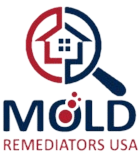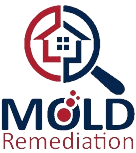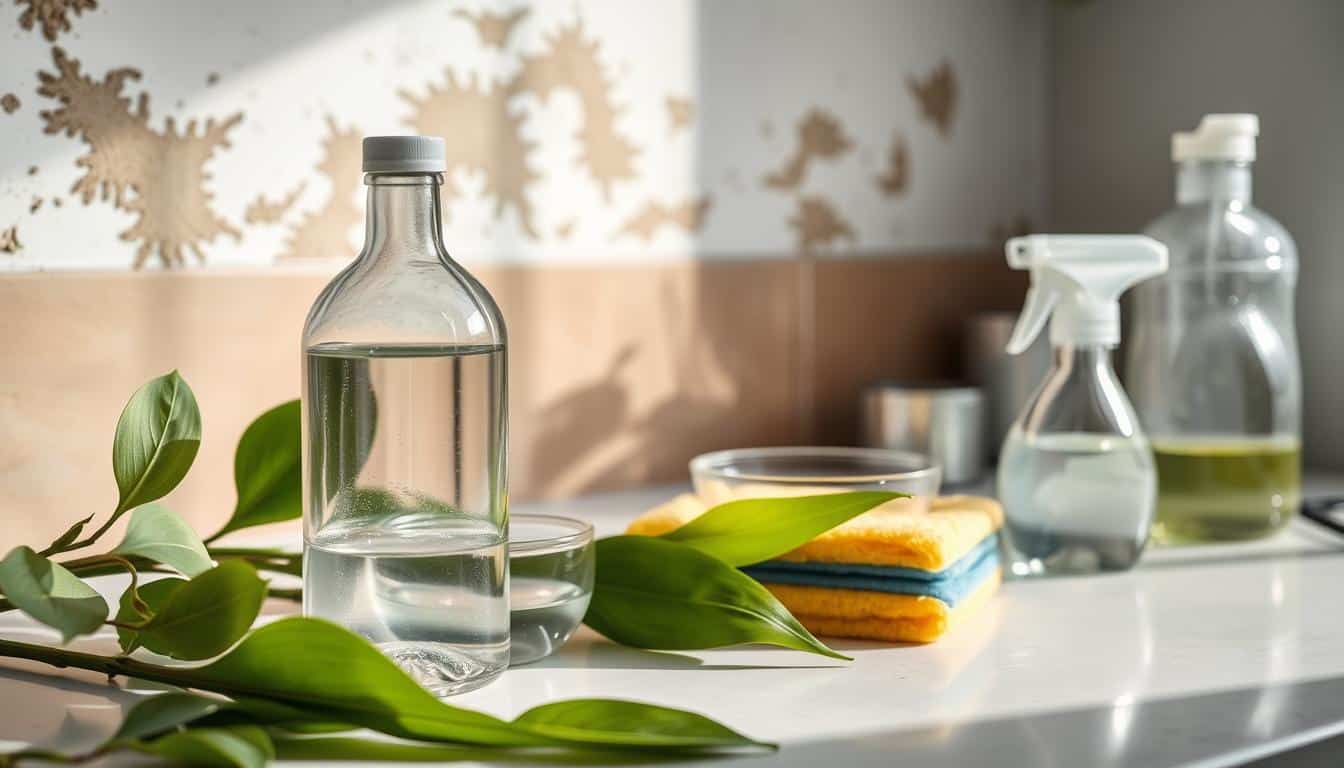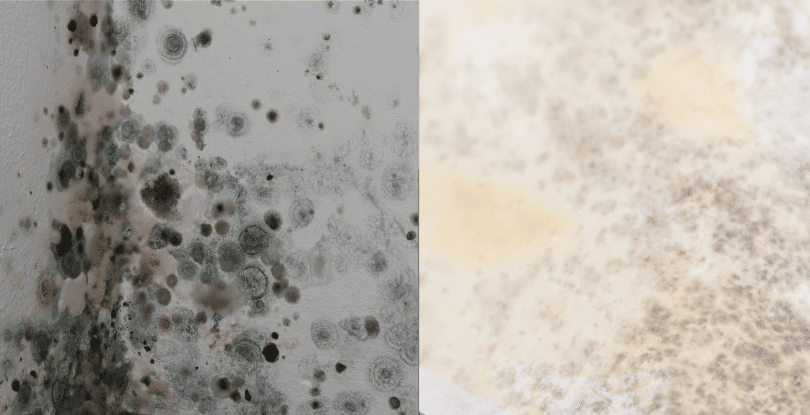Did you know vinegar can kill over 80% of mold species? This shows vinegar’s strong antimicrobial power. It makes vinegar a great natural way to fight mold and mildew at home.
As a professional copywriter, I’m eager to dive into vinegar’s mold-killing abilities. I’ll share how to use this eco-friendly, budget-friendly ingredient. This will help keep your home safe and healthy.
Key Takeaways
- Vinegar is a natural, antimicrobial agent that can kill over 80% of mold species.
- Vinegar requires at least an hour to work effectively on mold, and can be enhanced by mixing with other household products.
- Proper safety precautions, such as wearing gloves and a mask, are important when dealing with mold.
- Vinegar is more effective on porous surfaces compared to bleach for mold removal.
- Maintaining proper humidity levels and ventilation is crucial in preventing mold growth.
What is Mold and Why Should You Remove It?
Mold is a fungus that breaks down organic materials in nature. But, it’s harmful when it grows indoors. It thrives in damp, dark places like near leaky pipes or windows. Being exposed to mold can cause allergies, breathing problems, and even asthma.
Understanding Mold and Its Potential Health Risks
Mold growth is common in homes and needs quick action. It can cause allergies and breathing issues, especially for those with weak immune systems or asthma. Some molds, like black mold, can lead to serious health risks.
- Mold can cause allergic reactions, including sneezing, coughing, and skin irritation.
- Exposure to mold can make respiratory conditions like asthma worse, leading to breathing trouble.
- Certain molds, like Stachybotrys chartarum (black mold), are linked to severe health problems.
- People with weak immune systems or health issues are more at risk from mold exposure.
It’s key to remove mold fast to keep your home healthy and prevent health issues. By acting quickly, you protect your family’s health and avoid mold’s long-term effects.
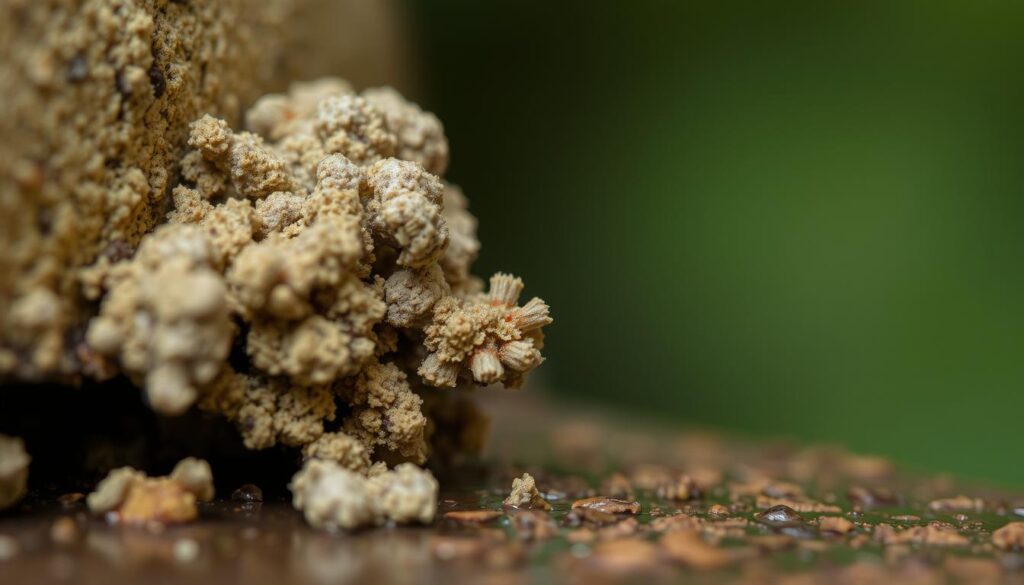
“Mold is a silent but serious threat to your health. Ignoring it can lead to respiratory problems, allergies, and even more severe conditions. Taking action to remove mold is crucial for maintaining a safe and healthy home environment.”
Does Vinegar Kill Mold and Mildew?
Household white vinegar is a natural way to fight mold and mildew at home. It has strong antifungal and antimicrobial properties. These properties help kill many types of fungi, including common household molds.
White vinegar usually has 5 to 8 percent acetic acid. This acid disrupts the growth of many microorganisms, including mold and mildew. Studies show vinegar with 4 to 4.2 percent acetic acid can treat Penicillium chrysogenum mold well. But it might not work as well against Aspergillus fumigatus.
Even though vinegar is strong, it might not kill all mold. The effectiveness of vinegar against mold can vary. It depends on the mold type, the surface it grows on, and the vinegar’s concentration. Vinegar works better on non-porous surfaces like tile and plastic. But it might not work as well on porous materials like drywall.
“Vinegar is a mild acid that kills 82% of mold species.” – Environmental Protection Agency (EPA)
If you have a big mold problem or it’s hard to treat, get help from a mold remediation company. The EPA says to get professional help if the mold covers more than 10 square feet.
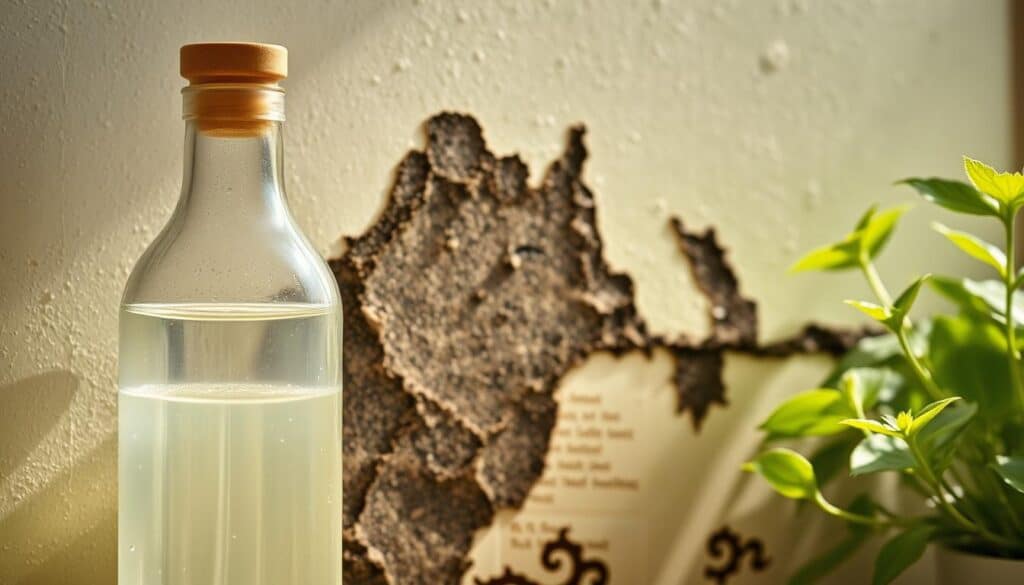
In short, vinegar can be a great, natural way to kill mold and mildew at home. But, it might not work in all situations. Knowing how to use vinegar for mold removal is key to solving this problem.
Can Vinegar Kill Mold and Mildew on Different Surfaces?
Vinegar is a natural and versatile solution for fighting mold and mildew at home. It works well on many surfaces, but the method can change based on the material. Let’s look at where vinegar can effectively kill mold and mildew.
Surfaces Where Vinegar Can Kill Mold
Vinegar is great for Vinegar Mold Removal on Drywall. Drywall is porous and prone to mold. Vinegar’s acidity can break down the mold, killing it. But, be careful not to use too much vinegar, as it can harm the drywall.
However, Vinegar Mold Removal on Concrete is not advised. Concrete is tough, and vinegar’s acidity can damage the cement. While vinegar might work sometimes, it’s safer to use other methods for concrete.
For Vinegar Mold Removal on Leather, vinegar is okay but with some caution. Mixing vinegar with water can prevent too much moisture and damage. This mix can kill mold without harming the leather.
| Surface | Vinegar Effectiveness | Precautions |
|---|---|---|
| Drywall | Effective | Avoid excessive exposure to prevent damage |
| Concrete | Not Recommended | Vinegar can potentially damage the cement |
| Leather | Effective | Dilute vinegar with water to prevent over-moisturizing |
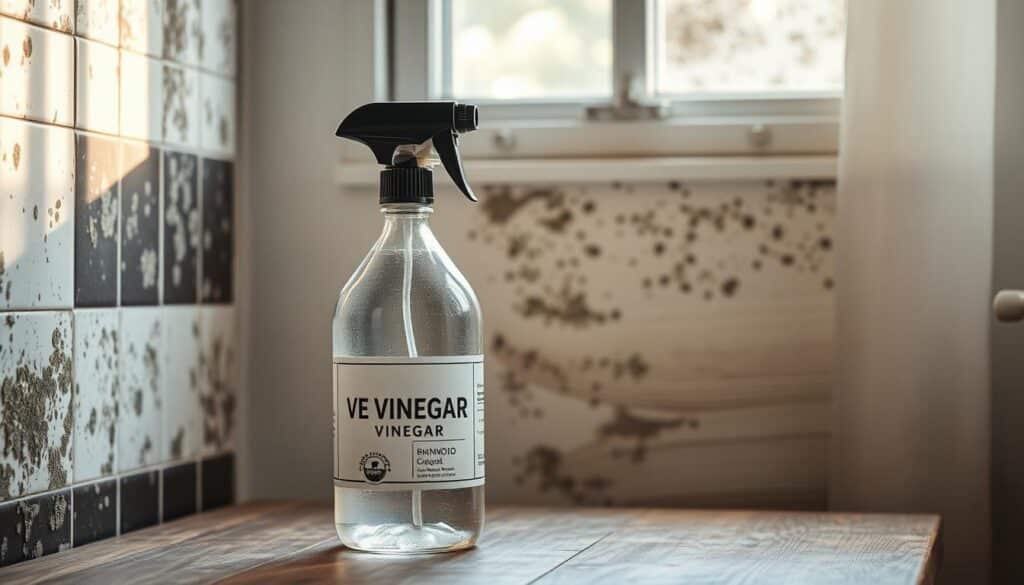
While vinegar is a good natural choice for mold removal, it’s key to consider the surface. Always take the right steps to avoid damage and get the best results.
Surfaces to Avoid Using Vinegar for Mold Removal
Vinegar can be a good natural way to get rid of mold in many places. But, it’s important to be careful when using it on certain surfaces at home. Vinegar’s acidity can harm some materials, causing problems if not used right.
Don’t use vinegar on stone countertops like marble or limestone. Vinegar’s acid can make these stones dull and etched. This can hurt their look and strength over time. Also, vinegar should not be used on wooden floors. It can damage the finish, causing color changes and harm.
Stay away from using vinegar on electronic screens too. It can mess with the screens’ anti-glare features, making things hard to see. Plus, vinegar can corrode metals like aluminum and copper in appliances and fixtures.
“Vinegar’s acidity can potentially damage certain types of surfaces in the home, so it’s crucial to be mindful of where you use it for mold removal.”
For surfaces that vinegar can’t handle, use other mold-fighting options or get help from mold experts. Knowing vinegar’s limits helps you fight mold safely and keep your home’s materials and finishes in good shape.
How to Use Vinegar to Remove Mold or Mildew
Vinegar is a natural and effective way to tackle mold or mildew at home. The process is simple and can stop mold from coming back.
Step-by-Step Guide for Effective Mold Removal with Vinegar
Start by fixing the moisture problem that caused the mold. Wear gloves, a mask, and goggles to protect yourself while using vinegar.
- Pour undiluted white vinegar into a spray bottle. Household white vinegar has 5 to 8 percent acetic acid. This acid kills many mold types, including black mold.
- Spray the vinegar on the moldy areas. Make sure to cover everything. Let it sit for at least an hour to kill the mold.
- Use a soft-bristle brush to scrub the area after the vinegar has worked. This helps remove any mold left behind.
- Mix 1 cup of baking soda with 1 cup of water to make a scrubbing solution. Use it to clean the area further.
- Rinse with clean water and spray vinegar again to prevent mold from coming back.
By following these steps, you can remove mold and mildew from your home. Vinegar is a natural and affordable solution.
“Vinegar is more effective than bleach against mold; bleach only kills surface mold.”
Alternative Ways to Get Rid of Mold
While vinegar is good for cleaning mold, other natural products work too. Tea tree oil is especially effective because it has compounds that fight mold better than vinegar or alcohol. Hydrogen peroxide and baking soda also have properties that can kill mold.
Cladosporium mold is common and can be blackish-brown to gray-green. It’s found both inside and outside on things like carpets and curtains. Aspergillus mold is everywhere and can be harmful to people with weak immune systems. Stachybotrys, or black mold, grows in damp places and can make you sneeze and cough.
To stop mold, keep humidity below 60%. Clean and dust often to stop mold from growing. If mold covers 10 square feet or more, you might need a pro. Always wear a mask, gloves, and goggles when dealing with mold.
Using Natural Mold Remedies
- Tea Tree Oil Mold Killer: Tea tree oil is a powerful antimicrobial that can effectively kill mold and prevent its regrowth.
- Hydrogen Peroxide Mold Killer: Hydrogen peroxide has disinfecting properties that make it an effective mold killer on hard surfaces.
- Baking Soda Mold Killer: Baking soda’s antimicrobial effects can help control mold growth and eliminate odors.
These natural mold remedies are great alternatives to harsh chemicals. They’re better for the environment and safer for you.
“Maintaining humidity levels below 60%, ideally between 30-50%, is recommended for preventing mold growth in homes.”
| Mold Type | Characteristics | Health Risks |
|---|---|---|
| Cladosporium | Blackish-brown to gray-green | Found indoors and outdoors, on carpets, curtains, upholstery, and wallpaper |
| Aspergillus | Very common, found indoors and outdoors | Can be harmful to immune-compromised individuals |
| Stachybotrys (Black Mold) | Grows on materials with high cellulose content due to moisture | Exposure can cause sneezing and coughing |
When to Call for Professional Help
Knowing when to call experts for mold problems is key. Small mold spots can be tackled with vinegar. But, big mold or toxic mold needs professional mold remediation help.
The EPA says call a pro if mold covers over 10 square feet. Experts have the right tools and know-how. They can safely remove mold, saving your home and health.
Seeing mold or a musty smell means you might have a big problem. Mold specialists, like those at CLEAR Restoration, can quickly find and remove mold in your home.
Small mold spots might be DIY fixable. But, big mold or toxic mold needs a pro. This is true for mold that spreads or involves toxic types.
Homeowners who’ve had mold before might face it again. This could be due to structural issues. In such cases, getting a mold remediation specialist is wise to avoid future problems.
Mold specialists are trained and equipped to handle various types and amounts of mold, offering effective services to prevent mold from returning.
If your mold problem seems too big or complex, don’t hesitate. Call in the professionals for a detailed check and effective fix.
Preventing Mold Growth in Your Home
Keeping your home mold-free is key to your family’s health and your property’s value. The main way to prevent household mold is by controlling moisture and fixing water leaks. Simple steps can help you control moisture for mold prevention and protect your home from mold.
To prevent mold, make sure your HVAC mold prevention is up to par. Clean and maintain your HVAC system to keep humidity levels in check. Also, using a dehumidifier for mold control can help remove excess moisture, making it harder for mold to grow.
It’s also important to check for and fix water leaks or damages quickly. Fixing leaks fast can stop mold from growing. Also, good ventilation in wet areas like bathrooms and kitchens helps control moisture for mold prevention.
By being proactive, you can lower the risk of preventing household mold. This keeps your home healthy and safe for your family. Remember, a little effort can make a big difference in protecting your home and health.
“Vinegar is approximately 90% effective against mold, and has been scientifically proven to be 99.9% effective in killing bacteria.”
Also, think about using vinegar as a natural mold fighter. It’s shown to be very effective and safe against mold. Mixing vinegar with baking soda or hydrogen peroxide makes a strong, eco-friendly mold remover.
The main thing is to keep your home dry and well-ventilated. Fix water problems fast and use natural solutions like vinegar. These steps will help you keep your home mold-free for your family’s health.
Conclusion
Vinegar is a strong, eco-friendly way to get rid of mold and mildew at home. It kills many common household molds because of its antifungal and antimicrobial properties. But, it might not work on all types of mold.
You can use vinegar on many surfaces, but be careful. It can harm certain materials like stone, wood, and electronics because of its acidity.
If you have a big mold problem or mold in your HVAC system, call a professional. Keeping moisture and ventilation under control is crucial to prevent mold. Using vinegar and other natural solutions, along with good mold remediation practices, helps keep your home safe and clean.
Vinegar is a great tool against mold and mildew. Its Summary of Vinegar Mold Removal, Effective Natural Mold Solutions, and Mold Remediation Best Practices make it a top choice for many homeowners.
FAQ
Can vinegar kill mold and mildew?
Yes, vinegar can kill many types of household mold and mildew. It has antifungal and antibacterial properties. However, it might not work on every type of mold.
What is mold and why should you remove it?
Mold, also known as mildew, is a fungus that grows in damp places. It can cause health problems like allergies and breathing issues. It’s important to remove mold quickly to avoid these health risks.
What are the antimicrobial properties of vinegar that help kill mold?
Household white vinegar has 5-8% acetic acid. This acid disrupts the growth of fungi and other microorganisms. So, vinegar is a natural way to kill many types of mold and mildew.
Can vinegar be used to kill mold on different surfaces?
Yes, vinegar can kill mold on drywall, leather, and some other surfaces. But, be careful. Vinegar’s acidity can damage surfaces like concrete and stone countertops.
What surfaces should you avoid using vinegar for mold removal?
Don’t use vinegar on marble and limestone countertops. It can dull them. Also, avoid using it on wooden floors and electronic screens. It can damage the finish and harm the screens.
How do you use vinegar to remove mold and mildew?
First, fix the moisture problem. Wear protective gear like gloves and goggles. Spray undiluted vinegar on the moldy area. Let it sit for an hour before scrubbing with a soft brush.
Make a baking soda solution to scrub away mold and stains. Rinse with clean water and spray vinegar again to prevent mold return.
Are there any other natural solutions for killing mold besides vinegar?
Yes, natural products like tea tree oil, hydrogen peroxide, and baking soda can kill mold. They have antimicrobial properties that help control mold growth.
When should you call a professional for mold removal?
You can clean small mold areas yourself, but for bigger areas, call a professional. They have the right tools and knowledge to safely remove mold. They can also test the mold to find the best removal method.
How can you prevent mold growth in your home?
To prevent mold, control moisture in your home. Check for water leaks and fix them quickly. Use fans and dehumidifiers to keep humidity levels right.
Don’t let water stand, and dry your home fast after flooding. Adding mold inhibitors to paint can also help. Keeping your home dry and well-ventilated stops mold before it starts.
